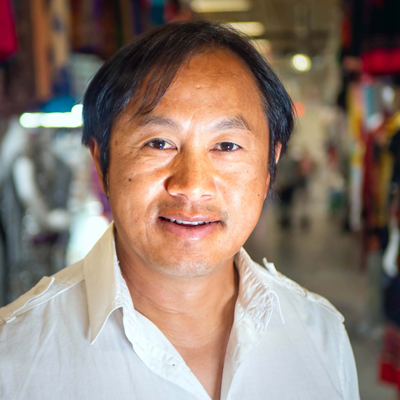“My name is Michael Yang. I’m originally from Laos. During the Vietnam War, my parents took us through the jungle into Laos to become political refugees, and from there we were screened for resettlement in the United States. That’s how I became a resident of the United States back in 1979. Though I’ve become a naturalized U.S. citizen, I’ll always live the Hmong refugee life.
“When we left Laos, we didn’t have a choice of where to go. Laos is a tropical country, and we landed in Minnesota, one of the coldest states in the country. I always asked my mom, ‘Why’d we come here? What is all of this cold white stuff outside?’ We didn’t know what snow was before coming to Minnesota. My family and I came here with nothing but the clothes on our backs. We didn’t know any English, we didn’t know how to use a toilet and we didn’t know how to use an electric rice cooker.
“I went on to earn my bachelor’s degree from St. John’s University. I also have two masters’ degrees, and am working on my doctorate in public policy and administration. I’m currently working for the City of Minneapolis as their Southeast Asian community specialist. We have a lot of Hmong, Vietnamese, Cambodian and Karen in Minneapolis. I live in St. Paul but I work in Minneapolis. Making sure that Minneapolis and the surrounding communities have a working and trusting relationship, making sure there’s good programming and resources available so that the Southeast Asian community has equal access to information and resources in the cities is very important to me.
“Growing up as a political refugee, I know other kids don’t know who you are and they just expect you to be like them every day. But as a political refugee, you have this trauma, you have this nightmare, you know how your brother and sister suffered during the war, you know how your father and mother suffered trying to get you through the jungle. So all of that lives with you on a daily basis as you’re trying to go to school and be friends with kids who don’t have those traumas. Then you go home and see your mom and dad crying about their cousins or sister or relatives back home in Thailand or Laos. We were sending money back home, every penny. With food stamps, I’d take one penny to buy one piece of candy and then go back and give the other 99 cents to my mom who would send it back to Thailand to help our cousin. So you’re living that trauma that other kids don’t grow up with and don’t understand.
“Growing up as a political refugee kid is extremely difficult, but my parents went through much more suffering than we have ever endured here during that time. Our kids who are born here now have an easier time because they don’t have to go through that same experience. But for us and our parents, sometimes I don’t know how we survived.
“Sadly, some people don’t understand who we are. Who are the Hmong? We’re not here to steal, we’re not here to take your jobs. We’re here because we were forced to move away from our home country, away from the jungle and mountains of Laos, because hundreds of us fought and died for American freedom. I didn’t want to be here, I had to be here for my safety and to stay alive. And I’m grateful to the American people who welcomed us with open arms. I’m grateful to the U.S. government. But overall, there are still many people who continue to misjudge the Hmong people.
“We work hard as farmers, as small business owners; we become police officers. My nephew is serving in the U.S. Armed Forces, my cousin is a designer for General Motors. So we make a lot of positive contributions to this country. We’re not here to take people’s jobs; we’re here to survive and make real contributions to our communities. That’s the message that people should know. The Hmong people are not a threat to anyone. We do our best in every place that we live; we clean our properties, stay in school, stay positive and contribute to our communities.
“My advice to other refugees is to be proud of who you are. Never let go of your culture, of your traditions. And never let go of your values of family, of respect and belief in yourself, of being a human, of having humanity in your heart like your culture teaches you. Most of all, be proud of who you are; be respectful of people; be respectful of life; be a fair person; and embrace diversity -- diversity of gender, diversity of people and diversity of voices.”
